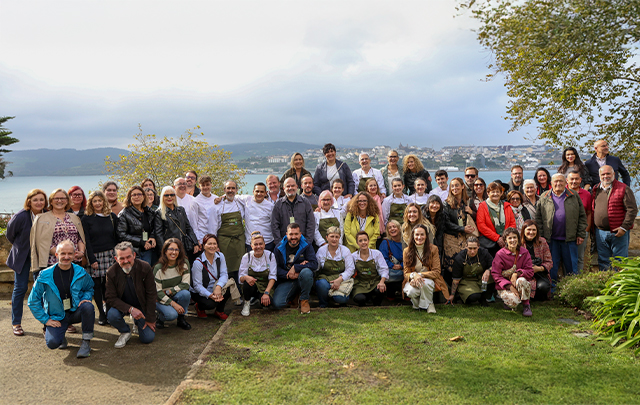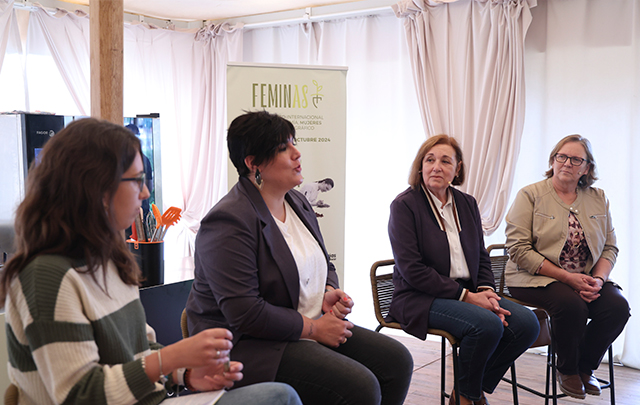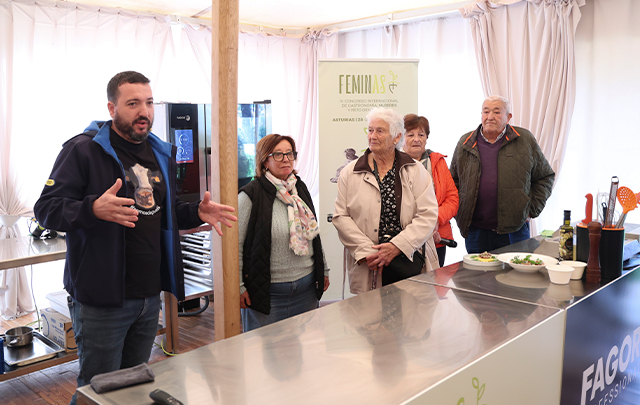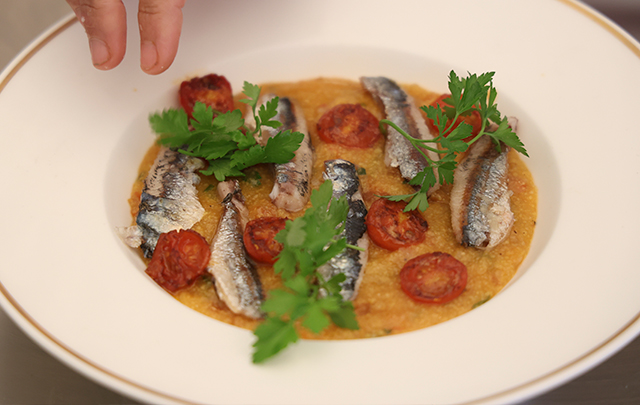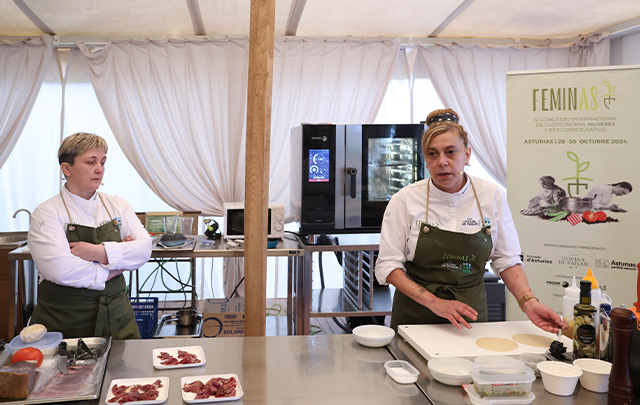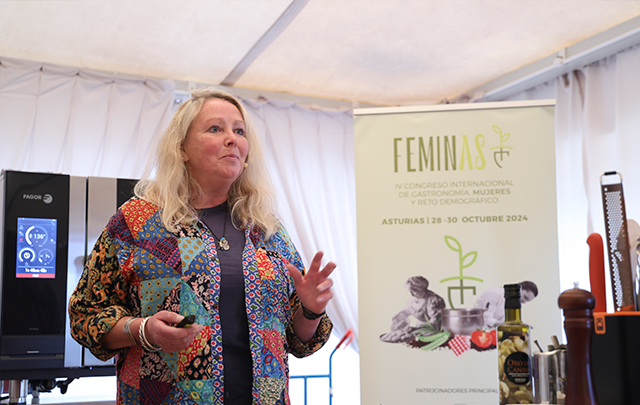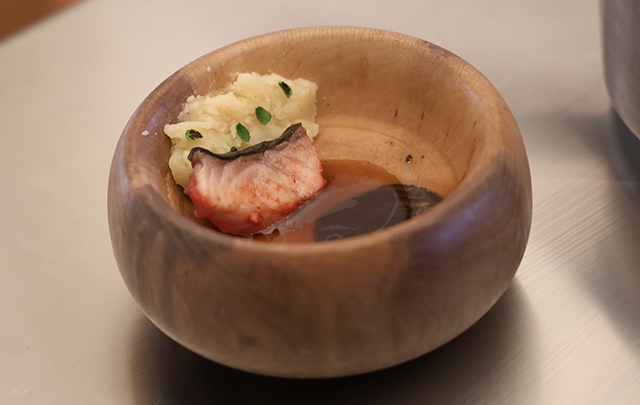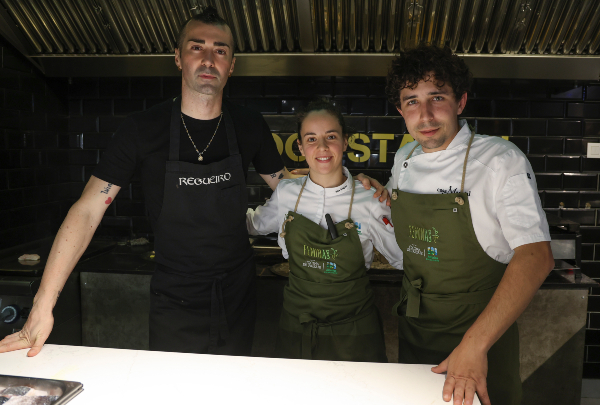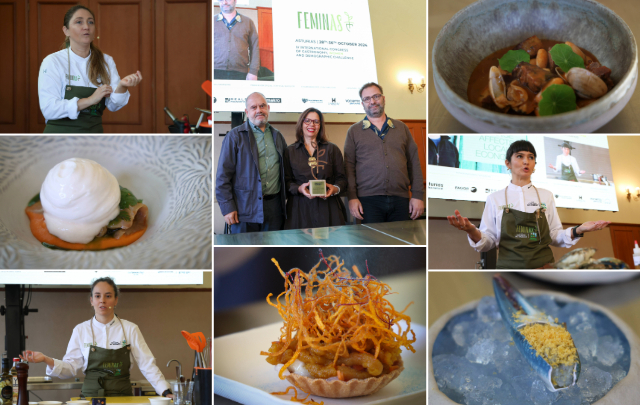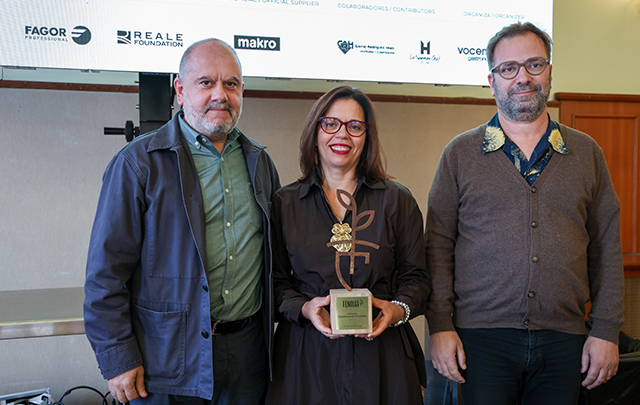News
The 4th edition of FéminAS travels around Western Asturias, focusing on gastronomy as an ally in the demographic challenge.
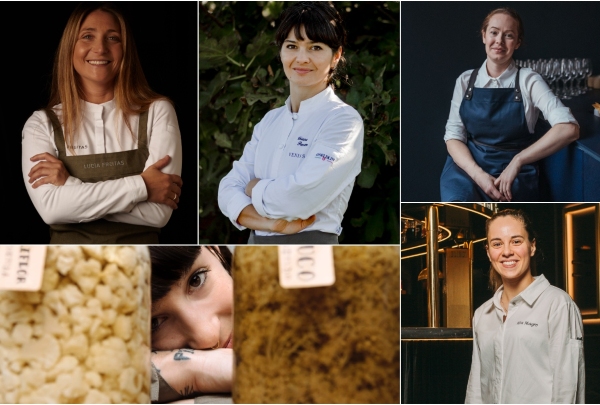
The Congress will start in Las Caldas and will showcase the tourist potential of Western Asturias, with activities in different locations in Luarca, Puerto de Vega, Ortigueira and the town of Figueras, in Castropol.
On 28, 29 and 30 October, Western Asturias will host the fourth edition of FéminAs, the International Congress on Women, Gastronomy and the Demographic Challenge, an event that continues to consolidate its role as a unique platform for the recognition and empowerment of women in gastronomy and the food sector. Since its inception in 2020, this congress has brought together leading women in the culinary, agricultural, livestock and other food-related fields to celebrate and make visible their contribution to the world of gastronomy and to contribute with their experience to tackling the demographic challenge in rural areas. FéminAs is a space that seeks not only to highlight the importance of women in these sectors, but also to promote gender equality, innovation and sustainability in the culinary field.
The congress will be held in various locations in western Asturias, such as Luarca, Puerto de Vega, Ortigueira and the village of Figueras, in the town of Castropol, the westernmost point of Asturias, a region that has an unparalleled role in protecting its gastronomic culture and has become a reference point for tourism. A region where women also play an essential role and are a point of reference in sectors such as agriculture and livestock. As on previous occasions, this is a travelling event that will bring together some of today's best chefs and Asturian cooks with Spanish producers, businesswomen, entrepreneurs and chefs.
FéminAs will also highlight cultural diversity in gastronomy and how women have been fundamental in the preservation and dissemination of culinary traditions, with the presence of traditional Asturian cooks who keep old recipes and techniques alive, as well as renowned chefs who combine these roots with innovation. Sectors such as livestock, preserves and cheese will play a prominent role in this edition, worlds where women are agents of change and their role is key to building fairer, more inclusive and resilient projects.
Combating depopulation
This edition of FéminAs explores the potential of gastronomy as a key factor in the fight against rural depopulation, as it combines the cultural richness of territories with economic development, the promotion of tourism and the attraction of new residents. Several female chefs and entrepreneurs will present their projects to show how the use of local resources, authentic products and culinary traditions can help revitalise rural areas and create new opportunities for employment and entrepreneurship.
Women like Elena Lucas (La Lobita*, Navaleno, Soria), who will use the forest to explain why she is one of the architects of Soria's positioning as a gastronomic reference destination, from her Michelin-starred restaurant in a village of barely 700 inhabitants. Her work reflects her passion for nature and the gastronomic richness of her surroundings in the least populated province of Spain, with an extremely low population density (less than 9 inhabitants per square kilometre) and which, since the mid-20th century, has suffered from a process of mass rural exodus to large industrial cities such as Madrid, Zaragoza or Barcelona. Known for his innovative approach to cuisine and his deep respect for the culinary tradition of the province of Soria, Lucas combines modern techniques with the region's indigenous ingredients, such as mushrooms and other local produce.
Roots
Culture, tradition and territory are also the words of another young Michelin-starred chef, Lydia Del Olmo (Ceibe*, Ourense). Together with her partner Xosé Magalhaes, Lydia has developed a gastronomic proposal that seeks to highlight local flavours and products, reinterpreting the culinary richness of Galicia from a modern perspective. Each dish at Ceibe reflects the essence of his Galician roots, with seafood, local meats and herbs. His restaurant is not only a place of culinary innovation, but also a place of revaluation of the identity of his region, Ourense, which, like much of Galicia, is facing a major demographic challenge, characterised by an ageing population, a low birth rate and the emigration of young people to more developed urban areas or outside the province. Without a critical mass of young people to support these activities, the survival of family farms and the transmission of knowledge and traditions are threatened. In response to this demographic challenge, gastronomy is becoming an important lever for revitalising the local economy and the territory.
Iris Jordán (Rest. Ansils*, Anciles, Huesca) defends her cuisine from Anciles, a small town of just 170 inhabitants in the municipality of Benasque, in the province of Huesca. He argues that the Benasque valley is an ideal place for haute cuisine, and although innovation is part of everyday life, the family recipe book is his mainstay: he is committed to game, poultry stews... He also tries to find lost recipes. His battle cry is clear: 'Long live the villages'.
Another Galician chef, Lucía Freitas (A Tafona*, Santiago de Compostela), will be at FéminAs to explain her strong commitment to the territory and, in particular, her work with local women producers. Her philosophy is based on valuing the products of Galicia's land and sea, and she works directly with women who work in vegetable gardens, shellfish farms, markets and other traditional activities. Freitas establishes a close relationship with these producers, supporting their work and highlighting the fundamental role they play in the food chain. This collaboration goes beyond supplying her kitchen; it is a way of boosting the local economy and affirming the role of women in rural areas, while helping to strengthen the social and economic fabric, creating a network of mutual support that benefits all parties.
Cooking invasive species
Ecological cooking and the choice of cooking invasive species is the theme that Chiara Pavan (Venissa*, Venice, Italy) will develop at FéminAs. An ambassador for climate change, Pavan is one of the leading figures in contemporary Italian cuisine. In her restaurant on the small island of Mazzorbo, Chiara practises what she defines as ecological cuisine, which focuses on vegetables from her own garden, local sourcing, the use of wild herbs, ancient grains and legumes, and reduced amounts of ethically sourced animal proteins (obtained only from exotic and invasive species) in favour of vegetable proteins. It has been awarded the Michelin Green Star for its concern for the environment and its relationship with the lagoon, where it aims to leave the smallest possible footprint on the territory.
Portugal is experiencing a moment of great culinary maturity and Rita Magro (Blind, Oporto), who this year won the 'Young Chef' 2024 award from the Michelin Guide, will also be at FéminAs. The 27-year-old chef has created a space in her restaurant that pays homage to Nobel Prize winner José Saramago's 'Essay on Blindness' and defends food that 'feels, touches and provokes', with some dishes even served to the blind, defending flavour above all else.
The link between game and gastronomyThe cuisine of Scottish chef Roberta Hall-McCarron (The Little Chartroom, Edinburgh, UK) is characterised by a strong commitment to local and seasonal produce, including game, which plays a crucial role in her culinary approach. Roberta works with indigenous Scottish ingredients such as venison, hare and pheasant, which not only reflect the wild and unique character of the Scottish countryside, but also help to maintain traditional Scottish practices such as sustainable hunting. The combination of hunting and gastronomy, as practised by Roberta, has a direct impact on sustaining the rural economy and tackling Scotland's demographic challenge.
If there is one region in the world where the demographic challenge has been successfully met, it is the Scottish Highlands. A mountainous region renowned for its natural beauty, rich history and unique cultural heritage, the Highlands lost much of its population during the 18th and 19th centuries as a result of forced evictions, with many families being forced to emigrate to America and elsewhere. Despite these difficulties, the Highlands have managed to position themselves as a model of sustainable development, cultural conservation and economic regeneration, gaining worldwide recognition. The Highlands have adopted a number of innovative strategies to revitalise the region and make it an example of sustainability. One of the main keys to success has been tourism, which has become a mainstay of the local economy. The focus has been on quality tourism that respects the natural environment and values the authenticity of the experience. At FéminAs, Ghillie Basan, writer and one of the great experts in the world of Scottish Highland gastronomy, will talk about identity, the demographic challenge and hospitality in the Highlands.
Sea and mountains in Western Asturias
Two views of the West come together in a presentation by Mary Fernández from Mesón El Centro, in Puerto de Vega, and Mirta Rodríguez from El Tormeiro, in Villayón. Sea and mountain on stage. María Antonia Fernández, Mary, is a symbol of Puerto de Vega, a fishing village that was once an important whaling port. A self-taught cook and perfectionist, a tireless reader of cookery books, always eager to learn, Mary is an example in the region and a gastronomic reference in Asturias. She has been a prize-winning chef for 30 years and, together with her husband, Mon, has taken over the reins at Mesón El Centro. Mirta Rodríguez's cuisine is one that breathes tradition. Her homemade food is based on traditional recipes, quality local produce and local products in the mountain restaurant she runs with her husband in Villayón, a quiet village in the interior of western Asturias.
In a large house overlooking the sea in Ortiguera, a small fishing village famous for its lighthouse, Elio Fernández, known as Elio Ferpel (Ferpel Gastonómico*, Ortiguera), is a strong advocate of the rural world and its way of life. He uses new culinary techniques to enhance the value of local products, some of which are considered to be of little gastronomic value, and to highlight the work of small producers. The chef is also working to recover a popular recipe book that has been lost.
The recovery of recipes as a strategy for revitalising communities will be the leitmotif of the talk that Elio Ferpel will give with some of the anonymous chefs with whom he has made a documentary that recovers some forgotten recipes that, thanks to the work of these women who will accompany him on stage, have not been lost.


